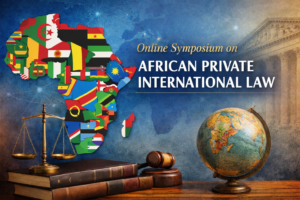Views
Online Symposium on Recent Developments in African PIL (II) – The Recognition and Enforcement of Foreign Judgments within the CEMAC Zone

As part of the second online symposium on recent developments in African private international law, we are pleased to present the second contribution, kindly prepared by Boris Awa (Kigali Independent University, Rwanda), on The Recognition and Enforcement of Foreign Judgments within the CEMAC Zone.
Article V(1)(e) of the 1958 New York Convention in Light of a Decision of the Turkish Court of Cassation
Posted on behalf of Erdem Küçüker, an attorney-at-law registered at the Istanbul Bar Association and a private law LL.M student at Koç University. Mr. Küçüker specializes in commercial arbitration, arbitration-related litigation and commercial litigation, and acts as secretary to arbitral tribunals.
Article V of the 1958 New York Convention (“NYC”) lists the grounds of non-enforcement of a foreign arbitral award. Accordingly, Article V(1)(e) provides that when “[t]he award has not yet become binding on the parties, or has been set aside or suspended by a competent authority of the country in which, or under the law of which, that award was made” the award’s enforcement may be refused.
In 2024, the Turkish Court of Cassation quashed the lower courts’ decision that declared an International Centre for Dispute Resolution of the American Arbitration Association (“ICDR”) award as enforceable, stating that the courts should have further investigated whether the award is final, enforceable and binding (Court of Cassation, 11th Civil Chamber, Docket No: E. 2022/5986, Decision No: K. 2024/2257, Date: 20.03.2024). This article explains the decision of the Turkish Court of Cassation and comments on the final, enforceable and binding character of an arbitral award in relation to Article V(1)(e) of the NYC. Read more
Online Symposium on Recent Developments in African PIL (I) – Recognition and Enforcement of International Judgments in Nigeria

As previously announced, we are launching the second online symposium on recent developments in African private international law. As part of this symposium, a series of blog posts addressing various aspects of recent developments in African private international law will be published on this platform over the coming days.
We open the series with a blog post by Abubakri Yekini (Senior Lecturer in Law at the University of Manchester) and Chukwuma Samuel Adesina Okoli (Assistant Professor in Commercial Conflict of Laws at the University of Birmingham and Senior Research Associate at the Centre for Private International Law in Emerging Countries at the University of Johannesburg), focusing on the recognition and enforcement of international judgments in Nigeria.
News
Conflict of laws in the South African courts: an(other) recent missed opportunity
Posted on behalf of Jason Mitchell, barrister at Maitland Chambers in London and at Group 621 in Johannesburg.
An Australian, Hannon, wants to book a Southern African safari with his partner, Murti, as a surprise birthday gift. He sees one he likes on an Australian travel website. Hannon fills in the online form.
It turns out that the website is just the agent for a South African company, Drifters Adventours. Drifters emailed Hannon the price and payment details. Attached to the email is a brochure. The brochure says, “Drifters do not accept responsibility for any loss, injury, damage, accident, fatality, delay or inconvenience experienced while on tour.” The brochure also says, “You will be required to complete and sign a full indemnity prior to your tour departure.” Read more
Part 4 of the Juridical Review for 2025
The recently published Part 4 of the Juridical Review for 2025 contains articles based on the International Perspectives on Scots Law seminar series held at the University of Stirling during 2023/2024. Some of these articles will be of interest to private international law aficionados:
‘The Pre-enactment Legislative Review Process in Scotland’ by Robert Brett Taylor and Adelyn L.M. Wilson (University of Strathclyde);
‘Taking the Transnational Nature of the UK Competition Appeal Tribunal Seriously: A Private International Law Perspective’ by Mihail Danov (University of Exeter);
‘The Evolution of Business and Human Rights Litigation against Multinational Companies’ by Mukarrum Ahmed (University of Lancaster);
‘Parties’ Intention and the Future Internationalisation of Scottish Arbitration – A Review of Scottish cases post 2010′ by Hong-Lin Yu (University of Stirling);
‘The Art of Persuasion: Embracing the Auld enemy and Beyond’ by Dr Mo Egan (University of Stirling).
JLMI – Call for Papers – Issue no. 3/2026
The following information was kindly shared with us by the editors of the JLMI.
The Journal of Law, Market & Innovation (JLMI) welcomes submissions for its third issue of 2025.
The Call for Papers for this 3rd issue is devoted to Digital markets, consumer autonomy and consumer welfare.
You can find the call with all the details at the following link:
Digital markets, consumer autonomy and consumer welfare
Prospective articles should be submitted in the form of abstract (around 800 words) or draft articles to submissions.jlmi@iuse.it within 25 february 2026. The publication of the issue is set for the end of November 2026.
For further information, or for consultation on a potential submission, you can contact us by email at editors.jlmi@iuse.it.
Visit our website to read the full announcement.


